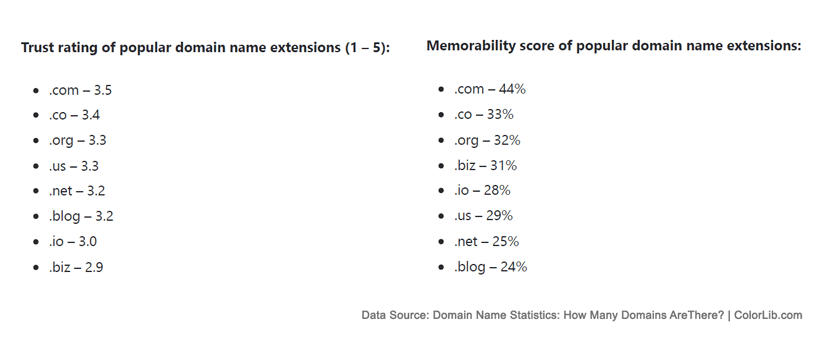It’s well known that .com is always the top choice when building a home online. As the most widely recognized domain, the phrase “dot com” has become synonymous with the internet itself.
Even when it’s not possible to get your exact company match, it’s worth exploring ways to modify your website address in order to secure a short, easy-to-remember .com name. But what happens when your exact name is available elsewhere? Is it worth buying?
Since the early days of the internet, there have been three main domain extensions (.com, .net, .org). For the longest time, .net was considered the next best alternative, but recent statistical data indicates the tides have turned, and the shorter version of .com is now the second best pick.
What is a Country Code TLD?
A ccTLD is a two-letter domain extension that signifies a specific country or territory on the internet. These extensions, such as “.es” for Spain or “.uk” for the United Kingdom, play a role in identifying websites and online resources associated with particular nations.
.CO was created to be the country code TLD for Colombia. In other words, it was originally meant to be used specifically by websites and businesses located in that country.
Benefits of .co
Colombia is one of the few examples of ccTLDs that can be registered by anyone around the world, which contributes to its high adoption rate. Some other common examples of “global ccTLDs” include: .io – British Indian Ocean Territory, .me – Montenegro, and .tv – Tuvalu. All of these have minimal restrictions and are available to global registrants.
1. High Trust Rating
Recent data released by Colorlib provides valuable insights into the number of registered domains and how people perceive them. According to this research, .co ranked as the second most trustworthy domain extension right behind .com.
Related: The Most Reputable Domain Extensions Ranked: Which Ones Are Worth Your Investment?
This means when people see a website with .co, they consider it to be a legitimate website that is easy to remember. If you are a company based in Colombia, you have the added benefit of targeting users with a sense of community in your home country.
2. High Memorability
The statistical data released by Colorlib also shows .co scoring very high in terms of memorability, positioned right between .com and .org as the second most memorable extension. This means that it’s easy for people to recall when they think of it later.

3. Shorter
Albeit only one character, using a .co extension makes your domain name shorter than the matching .com. The less your users need to type, the easier it is for them to find you. If you already own a .com domain, securing the .co is a wise choice to automatically redirect users who mistype your URL.
Drawbacks of .co
While .co carries a high memorability rating, there are a few instances where using a .co domain for a business not based in Colombia can have its drawbacks:
1. Small Feel
Putting your business on a .co domain gives it a startup feel. If your matching .com has a public sales lander, it will be obvious to your clients that you have a small budget.
2. More Expensive
Generally speaking, it costs more to register and renew a .co compared to the big three. Your domain may still come with a premium if you try to register a common dictionary word or abbreviation.
3. Potential Confusion
Because most major brands have been using .com since the dawn of the internet, it’s just where people naturally go. One of the major drawbacks of .co is the tendency to type “.com” by habit or autocorrect.
4. Branding
Because .com domains are so common, they have the benefit of using just the name in their branding. When you hear a brand, you just know to go to the .com. When using anything else, you must incorporate the extension into the branding to make it clear where you are. Your business becomes “MyCompany.co” instead of simply “MyCompany.”
5. Country code TLD
Country code TLDs do not harbor the same benefits as a generic TLD. These extensions are managed by national or territorial organizations known as ccTLD registries. Their tasks include maintaining domain names and offering registration services within their designated countries or territories. They also set the criteria for registering.

What Happens When a Visitor Accidentally Visits YourName.com Instead?
• If your matching .com is developed by another unrelated company, this will obviously lead to confusion.
• If your matching .com is developed by a competitor, this could lead to expensive legal issues.
• If your matching .com is a public sales lander, it will signal to your clients that you went the cheap route.
• If your matching .com does not resolve, people might think your website is broken and forget to come back later.
As you can see, in just about any case, not owning the .com can be potentially harmful to your business.
Conclusion
Choosing the right domain extension for your business is a critical decision that can impact your online presence and brand perception. While .co offers high trust ratings, memorability, and a shorter, modern alternative to .com, it also comes with potential drawbacks such as confusion, higher costs, and branding challenges.
If you can secure the .com version of your desired domain, it might save you from potential pitfalls and enhance your brand’s credibility. However, if .co aligns with your branding strategy and target audience, it can still be a valuable choice. Ultimately, the best domain extension for your business is the one that balances recognition, memorability, and alignment with your brand’s goals.
You May Also Like
- Optimize WordPress: The Best Plugins for Performance and Security
- How to Install FFmpeg 4 on CentOS 8/7, Ubuntu 20.04/18.04, and Other Linux Platforms
- Essential Ingredients: 9 Elements of a Successful Website
- Get More Website Conversions with These 10 Must-Have Landing Page Elements
- How to Reset the Root Password in MariaDB 10.5/10.4 and MySQL 8.0
